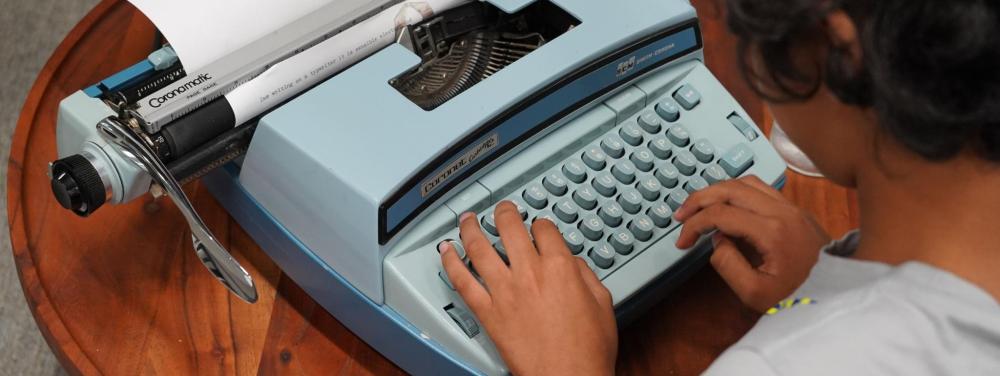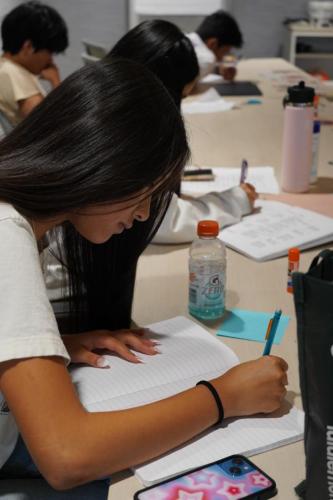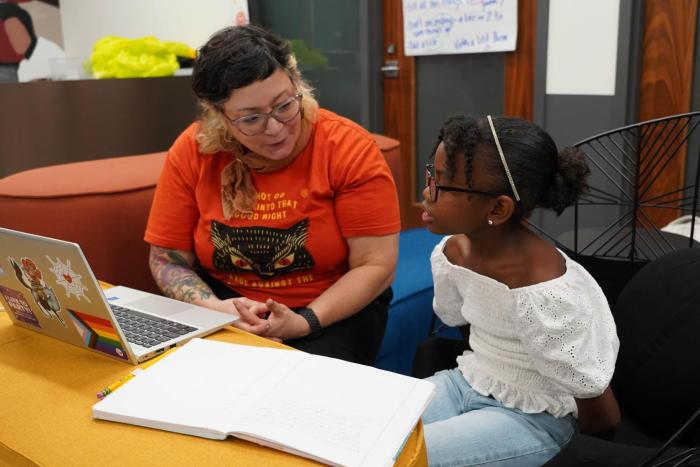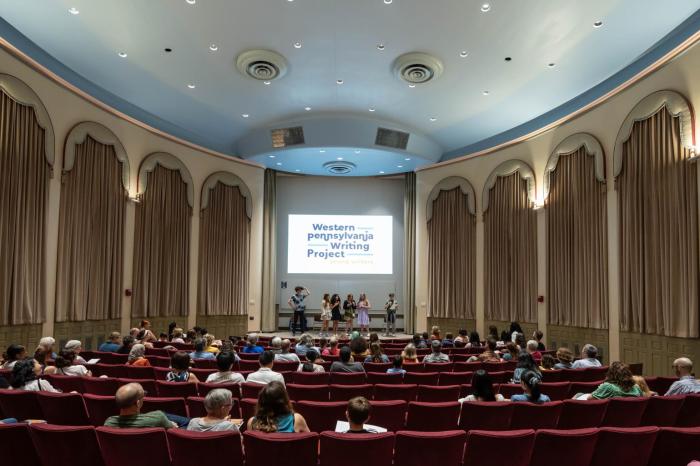
By Bridget Armon and Victoria Manda
In late June, the usually quiet summer days at Posvar Hall were filled with laughter, music, and the sounds of pencils scribbling in notebooks. For eight days, the Young Writers’ Institute (YWI) electrified Oakland, bringing creativity, education, and fun. YWI was established by the Western Pennsylvania Writing Project (WPWP) in 1989. The WPWP, a site of the National Writing Project, explores writing, literacy, and teaching within communities of writers and educators. It aims to help shape and grow teaching practices for education reform and school improvement.
“We believe that when teachers grow as writers and educators, it directly impacts how students grow as writers and learners,” said WPWP Director Dr. Khirsten L. Scott. “The mission of Young Writers Institute is twofold: It gives unique opportunities for professional development for our teachers while providing unique out-of-school writing opportunities for young writers.”
Scott describes this as a “loop of engagement”—a continuous and reciprocal process where educators and Pitt students develop as leaders and mentors through their work with young writers, while also growing from the experience of facilitating and witnessing student writing. The program becomes both a shaping space for youth and a training ground for educators, creating meaningful professional development across the greater Pittsburgh region.

YWI has developed a schedule for the young writers that works to inspire their creativity and foster their development. Students in grades 5-8 spent two days with the Center for Creativity (C4C) at Text and Context Lab. During the workshop, the young writers worked in teams to create collaborative stories, using the hero's journey to guide the plot. As the story came together, the sound of pencils scratching was drowned out by laughter and enthusiastic suggestions for the next challenge.
“I was so impressed with how creative and willing to collaborate with each other they were,” said Angela Hindes from the Center for Creativity, who created the workshop for the writers.
The C4C workshop ended with the opportunity for the young writers to experiment with a different medium. Each writer went home with art they created to tell their story.
A day at the Cathedral of Learning allowed the young writers to imagine their futures at a large scale. In the English nationality room, which is modeled after the early 20th-century Parliament, students imagined the laws they would create when it is their turn to shape the world. While young writers began unsure about their writing, creating connections to personal passions incited a spark of confidence.
“If I could change one thing about the United States laws and government, I would lower the cost of medical bills,” a rising 8th-grade student read from their journal, explaining why it was an important issue for them. The statement was met with applause from the room of writers.
This prompt invited students to explore writing from personal experience; this inquiry is essential for building these young writers' voices not only as writers, but as changemakers. Pursuing change through writing works as a reminder to these young voices that their opinions matter and can create something beautiful.
As voices develop and strengthen, it’s important to let them be heard. The young writers were encouraged to share their writing with their peers. In a low-stakes environment, all are encouraged to share a word, a thought, a sentence, or an entire piece.

“Creating a writing community within our space allowed the young writers to feel more comfortable to create, experiment with writing, and share in a supportive environment,” wrote Tammy Tullo, a WPWP fellow and a humanities teacher at Pittsburgh’s Gifted Center, “Their confidence grew as a result.”
The community created by YWI makes a lasting impact. The young writers left camp with not only more confidence in their writing, but a sense of acceptance and support from their peers. These new relationships acted as catalysts for inspiration and creativity in writing. In a setting of students with similar interests, the young writers were able to engage with their passion in a new way.
“It was a good experience for me to meet people from completely different backgrounds and interests,” said a young writer in their end-of-year survey.

A celebration at the Frick Fine Art’s auditorium, with writing and art on display for family and friends to enjoy, marked another successful year of YWI in the books. Writers took from camp a newfound curiosity for the world and a desire to investigate the ordinary. What camp left behind is inspiration that can be found anywhere – friends, nature, the classroom, and inside their own imaginations.
This program would not be possible without YWI’s sponsors: University of Pittsburgh Nationality Rooms, University of Pittsburgh School of Education Center for Urban Education, Carnegie Museum of Art, The University of Pittsburgh Center for Creativity, University of Pittsburgh Kenneth P. Dietrich School of Arts and Sciences Departments of English and Africana Studies, and the University of Pittsburgh School of Education.
A special thanks to the incredible staff who supported this year’s Young Writers Institute:
Aimee Frimani, Beaver Area School District; Tammy Rollo, PPS, Pittsburgh Gifted Center; Tess Riesmeyer, Sewickley Montessori Middle School; Jen Salvatore, PPS, Pittsburgh Gifted Center; Alaysia Plair-Easton, University of Pittsburgh Urban Education PhD student; Kiara Thorpe, University of Pittsburgh Urban Education PhD student; Bridget Armon, University of Pittsburgh English Major, and Victoria Manda, University of Pittsburgh English Major.
Connect with the Western Pennsylvania Writing Project and the Young Writers’ Institute for more information and future events.
Email: wpwp@pitt.edu
Website: https://www.wpwp.pitt.edu/
